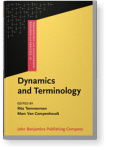11. Concept change, term dynamics and culture-boundness in economic-administrative domains
A central purpose in terminology work is to capture the conceptual structures of the domains and relevant terminology. However, knowledge development may result in dynamism in both concepts and terms, something which challenges this pursuit. The fact that some concepts can easily be transferred from one language culture to another, whereas other concepts are highly culture bound, complicates the task even further. Three different economic-administrative domains are used to exemplify this challenge, i.e., Organisational Behaviour, Financial Accounting and Crisis, Restructuring and Growth. The chapter demonstrates how the factors causing knowledge development and concept changes in the three domains are quite different, and how this calls for different corpora from which to extract terminographic or lexicographic data.
References (44)
About.com. [URL]. (Accessed May 10, 2012).
Ahmad, Khurshid. 1996. “A Terminology Dynamic and the Growth of Knowledge: a Case Study in Nuclear Physics and in the Philosophy of Science.” In TKE’96 Terminology and Knowledge Engineering, ed. by Christian Galinski, and Klaus–Dirk Schmitz, 1–11. Frankfurt/M.: Indeks Verlag.
Anderman, Gunilla, and Maragret Rogers. 2005. In and Out of English: For Better, For Worse? Buffalo: Multilingual Matters.
Budin, Gerhard. 1996. “Evolution of Scientific Terminologies.” In TKE’96: Terminology and Knowledge Engineering, ed. by Christian Galinski, and Klaus-Dirk Schmitz, 37–34. Frankfurt/M: Indeks Verlag.
Bungarten, Theo. 1981. “Wissenschaft, Sprache und Gesellschaft.” Wissenschaftssprache- Beiträge zur Methodologie, theoretischen Fundierung und Deskription, ed. by Theo Bungarten, 14–53. München: Wilhelm Fink Verlag.
BusinessDictionary.com. [URL]. (Accessed May 12, 2012).
Crisis, Restructuring and Growth. [URL]. (Accessed May 9, 2012).
Dahlberg, Ingetraut. 1978. Ontical Structures and Universal Classification. Bangalore: Sarada Ranganathan Endownment for Library Science.
Deaux, Kay, Francis C. Dane, and Lawrence S. Wrightsman. 1993. Social Psychology in the ‘90s. 6th edition. California: Brooks/Cole.
El-Farargy, Nancy. 2009. “Epistemological Beliefs and Intellectual Development in the Physical Sciences.” New Directions 5. [URL]. (Accessed May 9, 2012).
Engberg, Jan. 2009. “Assessing the Dynamic Character of Legal Terms.” Fachsprache 31 (3-4), 126–138.
Engberg, Jan. 2012. Legal Terminology, Conceptual Structures and Intelligibility. Presentation held at
NHH Norwegian School of Economics
, May 15, 2012.
Fokus på IFRS [Focus on IFRS]. 2009. [URL]. (Accessed May 23, 2012).
Framework for the Preparation and Presentation of Financial Statements 1 January 2009 (Adopted by the IASB April 2001).
Funke, Joachim. 1995. “Experimental Research on Complex Problem Solving.” In Complex Problem Solving: The European Perspective, ed. by Peter A. Frensch, and Joachim Funke, 243–268. Hillsdale, NJ: Lawrence Erlbaum Associates.
Funke, Joachim, and Peter A. Frensch. 2007. “Complex Problem Solving: The European Perspective –10 Years After.” In Problem Solving, ed. by David Jonassen, 25–47. Hillsdale, NJ: Erlbaum.
Funtowicz, Silvio O., and Jerome R. Ravetz. 1994. “The Worth of a Songbird: Ecological Economics as a Post-normal Science.” Ecological Economics 10 (3): 197–207. 

IFRS.org. [URL]. (Accessed March 24, 2014).
IFRS – International Financial Reporting Standards (IFRSsTM) including International Accounting Standards (IASsTM) and Interpretations as at 31 March 2004. London: International Accounting Standards Board.
InvestorWords.com. [URL]. (Accessed May 10, 2012).
Kristiansen, Marita. 2004. The Multi-Disciplinary Nature of the Social Sciences. Investigating Disciplinary Autonomy in Organisational Behaviour by means of Terminological Analysis. Ph.D. Thesis Presented at University of Bergen/NHH, Bergen.
Kristiansen, Marita. 2006. “A Terminological Approach to Multi-Disciplinary Domains and Disciplinary Autonomy.” In Terminology Science and Research – Journal of the International Institute of Terminology Research 17, ed. by Birthe Toft, and Nina Pilke, 36–45. Vasa/Kolding: IITF.
Kristiansen, Marita. 2012a. “Using Web-based Corpora to Find Norwegian Specialised Neologies.” Communication and Language at Work 1: 10–19.
Kristiansen, Marita. 2012b. “Financial Jargon in a General Newspaper Corpus.” In Exploring Newspaper Language. Using the Web to Create and Investigate a Large Corpus of Modern Norwegian, ed. by Gisle Andersen, 257–283. Amsterdam: John Benjamins. 

Kuhn, Thomas S. 1970. The Structure of Scientific Revolutions. Chicago: University of Chicago.
Laurén, Christer, Johan Myking, and Heribert Picht. 1998. Terminologie unter der Lupe. Vom Grenzgebiet zym Wissenschaftszweig [IITF Series 9]. Wien: Termnet.
Lovdata.no. [URL]. (Accessed May 10, 2012).
Mellin-Olsen, Stieg. 1993. Kunnskapsformidling. Virksomhetsteoretiske perspektiver. 2nd edition. Nordås: Caspar forlag.
Monsen, Norvald, and Wanda A. Wallace. 1997. “Norsk Hydro’s Communication to International Capital Markets: A Blend of Accounting Principles.” Scandinavian Journal of Management 13 (1): 95–112. 

Northcraft, Gregory B., and Margaret A. Neale. 1994. Organizational Behavior – A Management Challenge. 2nd edition. Orlando: The Dryden Press.
Norwegian Newspaper Corpus. [URL]. (Accessed May 4, 2012).
NOU 1996:2 Verdipapirhandel [Norwegian draft bill relating to securities trading] [URL]. (Accessed May 25, 2012).
Oeser, Erhard. 1994. “Terminology and Philosophy of Science.” In International Conference on Terminology Science and Terminology Planning; Riga. International IITF-Workshop Theoretical Issues of Terminology Science, ed. by Jennifer K. Draskau, and Heribert Picht, 24–34. Wien: IITF.
Ot.prp. nr. 71 (2008–2009). Om lov om endringer i lov 1. april 2005 nr. 15 om universiteter og høyskoler. [URL]. (Accessed April 1, 2012).
Perry, William G. 1968. Forms of Intellectual and Ethical Development in the College Years: A Scheme. New York: Holt, Rinehart and Winston.
Pilke, Nina. 2000. Dynamiska fackbegrepp. Att strukturera vetande om handlingar och händelser inom teknik, medicin och juridik. Vasa: University of Vasa.
Pindyck, Robert S., and Daniel L. Rubinfeld. 2005. Microeconomics. New Jersey: Pearson Prentice Hall.
Shortridge, Rebecca T., and Pamela A. Smith. 2009. “Understanding the Changes in Accounting Thought.” Research in Accounting Regulation 21 (1): 11–18. 

Spang-Hanssen, Henning. 1983. “Kommunikation og fagsprog.” In Språk i Norden, ed. by Else Bojsen, Mikael Reuter, Ståle Løland and Catharina Grünbaum, S25–37. Oslo: Cappelen.
Thagard, Paul. 1992. Conceptual Revolutions. Princeton, N.J.: Princeton University Press.
Themanager.org. [URL]. (Accessed April 20, 2012).
UHR.no. [URL]. (Accessed May 21, 2012).
Våge, Ole. 2009. Harvesting the Blue Field: The Spanish and Norwegian Terminology of Aquaculture. Unpublished presentation at the
XVII European Symposium on Languages for Specific Purposes 17–21 August 2009
. Århus, Denmark.
Cited by (1)
Cited by one other publication
Liu, Yujing & Xiangqing Wei
This list is based on CrossRef data as of 24 july 2024. Please note that it may not be complete. Sources presented here have been supplied by the respective publishers.
Any errors therein should be reported to them.
